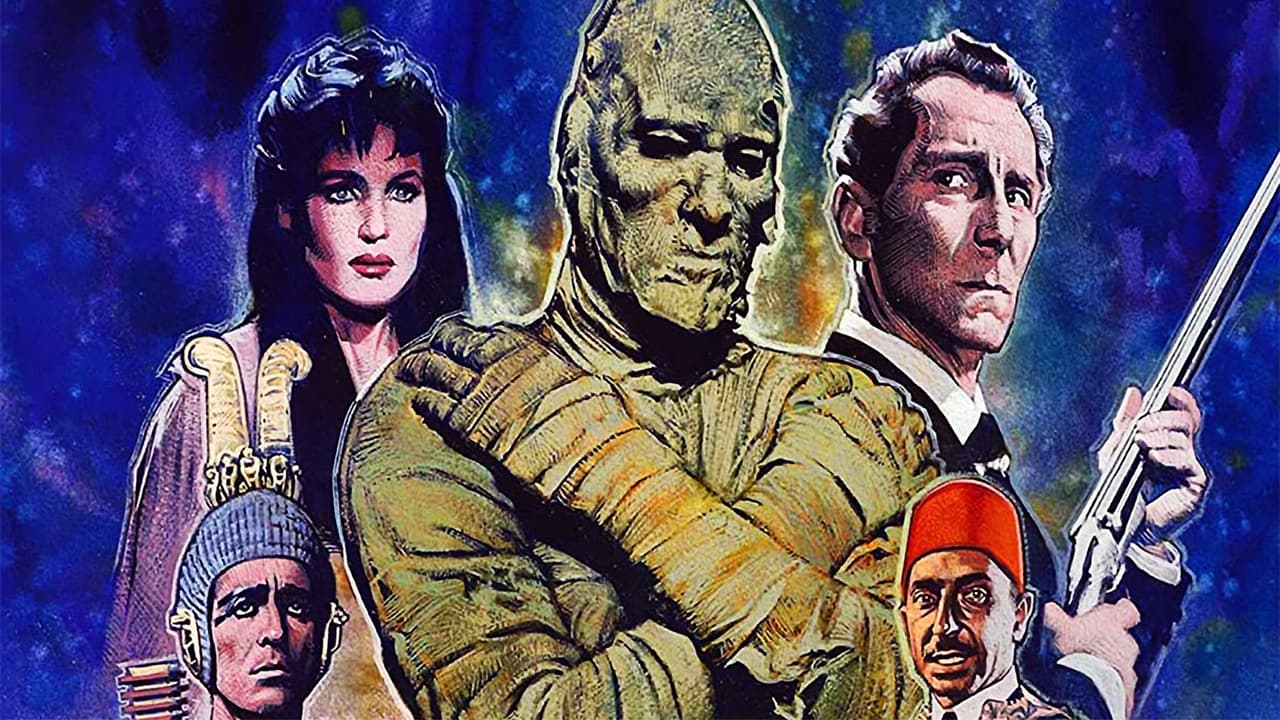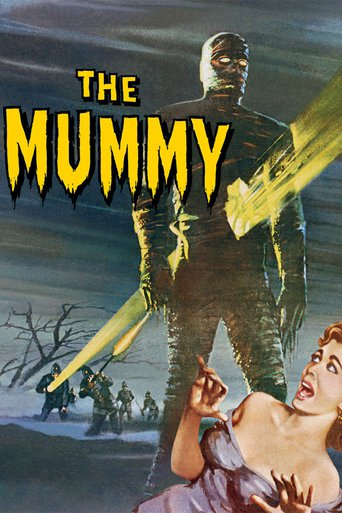

Very well executed
... View MoreGood start, but then it gets ruined
... View MoreThis movie feels like it was made purely to piss off people who want good shows
... View MoreThis is a coming of age storyline that you've seen in one form or another for decades. It takes a truly unique voice to make yet another one worth watching.
... View MoreA masterfully crafted classic in every sense of the word, my only complaints are that there is so much time given to the 'legend' backstory when it really adds no enjoyment to the plot of the present day and simply seems like filler; also that protagonist's wife was introduced so randomly in the middle of the film. The mummy looks absolutely amazing.
... View MoreWhen thinking about Hammer films which actually form part of a series, the obvious ones are the Dracula's and the Frankenstein's. There were, of course, other occasions when they made sequential films in their long history, such as the Jurassic classics (their prehistoric series) and the Mummy cycle. Even the most ardent fans of the studio accept that some of the Mummy movies are a little dull, and the main cause of this I feel lies with the 'monster' itself... mummies are just too slow and lumbering to have much shelf life as the bad guys in a whole series of bloodcurdlers. One film, yes, why not? But a whole series? Perhaps not. For me, the best of Hammer's Mummy cycle is the first - The Mummy from 1959, directed by the ever-reliable Terence Fisher, featuring yet another collaboration of the studio's favoured star duo Peter Cushing and Christopher Lee.Egyptologists Stephen Banning (Felix Aylmer), Joseph Whemple (Raymond Huntley) and John Banning (Peter Cushing) discover the long-lost tomb of of the ancient Queen Ananka. Against the dire warnings of Egyptian villain Mehemet Bey (George Pastell), they enter the tomb. Something happens to Stephen inside the tomb which leaves him in a vegetative state, driven out of his mind by some nameless fright. Later, it becomes clear that he was attacked by the still-living mummified figure of Kharis (Christopher Lee), the Queen's high priest and secret lover... and when Mehemet Bey brings the mummy to England to finish off the others who desecrated Ananka's tomb, the scene is set for a final battle to the death.Lee's mummy, a gruesome and unstoppable automaton, is actually a rather interesting monster for this type of film. Powerful and frightening, yet strangely pitiable, it's a testament to his acting that he creates empathy from beneath so many layers of make-up. Cushing is good value too as the gammy-legged scholar trying to defeat he creature. What hurts The Mummy somewhat is the rather long-winded set-up, involving heavy-going and repetitive recap sequences narrated by Cushing. At its best colourful and exciting, at its worst dull and long-winded, The Mummy is a decent enough genre picture but not really top-tier stuff from the folks at Hammer.
... View MoreI know there is a Boris Karloff original, and of course there was the Brendan Fraser film followed by two sequels, I was interested to see this offering from Hammer (Horror) Studios, directed by Terence Fisher (The Curse of Frankenstein, Dracula, The Hound of the Baskervilles). Basically in Egypt in 1895, archaeologists John Banning (Peter Cushing), his father Stephen (Felix Aylmer) and his uncle Joseph Whemple (Raymond Huntley) are searching for the tomb of Princess Ananka, the high priestess of the god Karnak, John has a broken leg so cannot accompany his father and uncle when the tomb is opened. An Egyptian named Mehemet Bey (George Pastell) warns them not to enter, or face the fatal consequences of the curse against desecrators, they ignore him and discover Ananka's sarcophagus, Joseph leaves to tell John the good news, while Stephen finds and reads from the Scroll of Life, he is heard by the others screaming and is found in a catatonic state. Three years later, in England, Stephen is in Engerfield Nursing Home for the Mentally Disordered and out of his catatonia calls for his son, he tells him that reading the Scroll of Life he unintentionally brought back to life Kharis (Sir Christopher Lee), the mummified high priest of Karnak. In flashback we see that Kharis had a forbidden love with Princess Ananka, and following her death he attempted to use the Scroll of Life to bring her back to life, but he was arrested before being able to complete the reading, he was punished to be mummified and entombed alive to serve forever as the guardian of Princess Ananka's tomb, in the present day Stephen warns his disbelieving son that Kharis will hunt down and kill all who desecrated Anaka's tomb. Mehemet Bey is revealed to be a devoted worshipper of Karnak, he comes to England to wreak revenge on the three archaeologists who disturbed the Egyptian tomb, he hires drunken carters Pat (Harold Goodwin) and Mike (Denis Shaw) to transport the slumbering Kharisin a crate to his rented home, but their drunken driving causes the crate to sink into a bog. Later though Mehemet reads from the Scroll of Life to summon Kharis to rise from the dead and out of the mud, he sends the Mummy to murder Stephen Banning, and the following night the Mummy is sent to murder Joseph Whemple, right before John's eyes, he shoots the walking corpse at close range with a revolver, but to no effect. Police Inspector Mulrooney (Eddie Byrne) is assigned to solve the murders, being skeptical he deals is cold hard facts and does not believe John's story about the killer mummy, even being told he may be Kharis's third victim, while the investigation goes on John notices his wife Isobel (Yvonne Furneaux) bares a striking resemblance to Princess Ananka, meanwhile gathering testimonial evidence from others in the community Mulrooney slowly gathers that the mummy may in fact be real. Mehemet Bey sends the mummy to kill his final victim, but when Isobel rushes into the room to help John, Kharis sees her, releasing John and soon leaves, Mehemet mistakenly thinks the mummy has completed his task and prepares to return to Egypt, John suspects Mehemet of being responsible for the resurrection and controlling of the mummy, and to the Egyptian's surprise he pays him a visit. After John leaves Mehemet Bey sends Kharis for a second attempt to kill him, while Mehemet deals with other police officers guarding the house, Mulrooney is knocked unconscious, Kharis finds John in the study and starts choking him, Isobel runs in to help again, but the mummy only recognises him with her hair down, and he releases John. Mehemet comes in and orders the mummy to kill Isobel, he refuses, Mehemet attempts to murder Isobel himself but Kharis kills him, unconscious Isobel is carried by the mummy to the swamp, John, Mulrooney and other policemen follow, John shouts for Isobel to wake and tell him to put her down, she reluctantly obeys, he moves away and the policemen open fire, the mummy sinks into the ooze, taking the Scroll of Life with him. Also starring Worzel Gummidge's Michael Ripper as Poacher and Willoughby Gray as Dr. Reilly. Cushing is crisp and charming as the archaeologist who goes against the threat from Ancient Egypt, and Lee is creepy both in the flashback pharaoh look and bandaged up and limping around, it is a simple enough story, you can tell the 1999 remake borrowed elements of the same storyline, there are only mildly bloody moments and the good old fashioned talkative scenes, it may not be as great as the other Hammer films, but it is a worthwhile classic horror. Good!
... View MoreProduced during the halcyon days of Hammer Films, with the customary duo of Peter Cushing and Christopher Lee in leading roles, Terence Fisher's film offers an interesting perspective on the story's colonial elements. By uncovering the untouched tomb of Princess Ananka Stephen Banning (Felix Aylmer) has in a sense desecrated the past and deserves to be punished for it. In a sense the Egyptian Mehemet Bey (George Pastell( has a point: what right do British archaeologists have to come to Egypt and raid a tomb, just so that they can take the artifacts back to their country of origin on the pretext of wanting to learn something about the past? Mehemet has a dialog with Stephen's son John (Peter Cushing) on this very subject; John tries to justify his work, but cannot really understand the depth of Mehemet's religious belief.Having said that, Terence Fisher's film is not without its strong colonialist elements. In the studio-bound sequences at the beginning, ostensibly set in Egypt, the locals are represented as slaves and/or coolies simply serving the interests of Banning, his associate Joseph Whemple (Raymond Huntley) and John. They carry the coffins, lay the explosives to blow up the tombs, and carry out the Europeans' wishes without question. There is also the issue of mimicking: Lee has a largely silent role as the Egyptian mummy, save for a flashback scene set in the past where his enduring love for Princess Ananka (Yvonne Furneaux) is revealed.Shot in lurid color, this version of THE MUMMY emphasizes the story's Gothic elements. There are numerous sequences set in the wilderness outside Banning's house, where Mehemet and the Mummy come in pursuit of their victims. The final sequence is straight out of James Whale's FRANKENSTEIN, as the Mummy carries off John's wife Isobel (Furneaux) who bears more than a passing resemblance to the Princess. And there are also two swamp sequences that suggest quite literally that the protagonists are consigned to oblivion - a dark and sludge-like state that houses the living dead.As with all Hammer films, the story unfolds at a brisk pace, with plenty of time allowed for cameos from many of the studio's favorite repertory of performers - Michael Ripper, George Woodbridge. The stately home that served as the studio's offices also serves as the main setting for much of the drama. Little attempt is made to disguise the staginess of the film - especially at the beginning - but there are more than a few shocks to compensate.
... View More